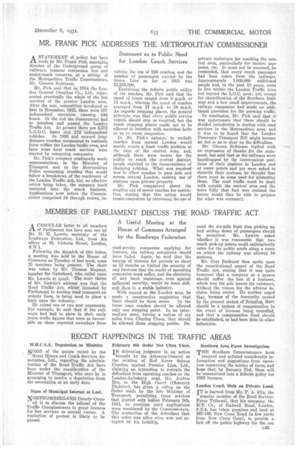MEMBERS OF PARLIAMENT DISCUSS THE ROADTRAFFIC ACT
Page 65

If you've noticed an error in this article please click here to report it so we can fix it.
A Useful Meeting at the House of Commons Arranged by the Roadways Federation ACIRCULAR letter to all members of Parliament has been sent out by Mr. H. H. Lawrie, secretary of the Roadways Federation, Ltd., from his offiees at 39, Victoria Street, London, S.W.1.
Following the dispatch of this letter, a meeting was held in the House of Commons on Tuesday of last week, some 25 members being present. The chair was taken by Mr. Thomas Magnay, 'Member for Gateshead, who called upon Mr. Lawrie to speak. The main theme of Mr. Lawrie's address was that the Road Traffic Act, whilst intended by Parliament to develop road transport on orderly lines, is being used to place a limit upon the industry.
He raised one or two new arguments. For example, he said that if the railways had had to show in their early years traffic figures that were as favourable as those expected nowadays from
road-service companies applying for licences, the railway companies would have failed. Again, he said that the issuing of licences for periods so short as 12 months so limited the security of any business that the credit of operating companies must suffer, and the obtaining of any bank assistance, even against Collateral. security, would be more difficult than in a stable industry.
With regard to the London strea, he made a constructive suggestion that 'there should be three zones. In the inner zone coaches should be allowed only one stopping point. In an intermediate zone, having a radius of six miles from Charing Cross, they should be allowed three stopping points. Be yond the six-mile limit free picking up and setting down of passengers should be permitted. Mr. Lawrie asked whether it was reasonable that two coach pick-up points could satisfactorily cater for the public needs along a route on which the railway was allowed 16 stations.
Mr. Cort Bathurst then spoke upon the constitutional aspect of the Road Traffic Act, stating that it was quite incorrect that a company or a person should suffer the loss of a business, which was the sole means for existence, without the reason for the adverse decision being stated. He further urged that, because of the insecurity caused by the present systerd of licensing, there should be a system of compensation in the event of licences being cancelled, and that a compensation fund should be established, as had been done in other industries.














































































































